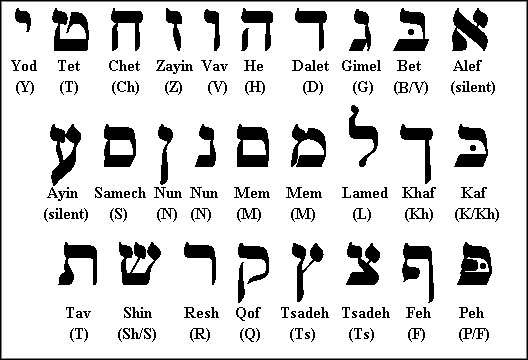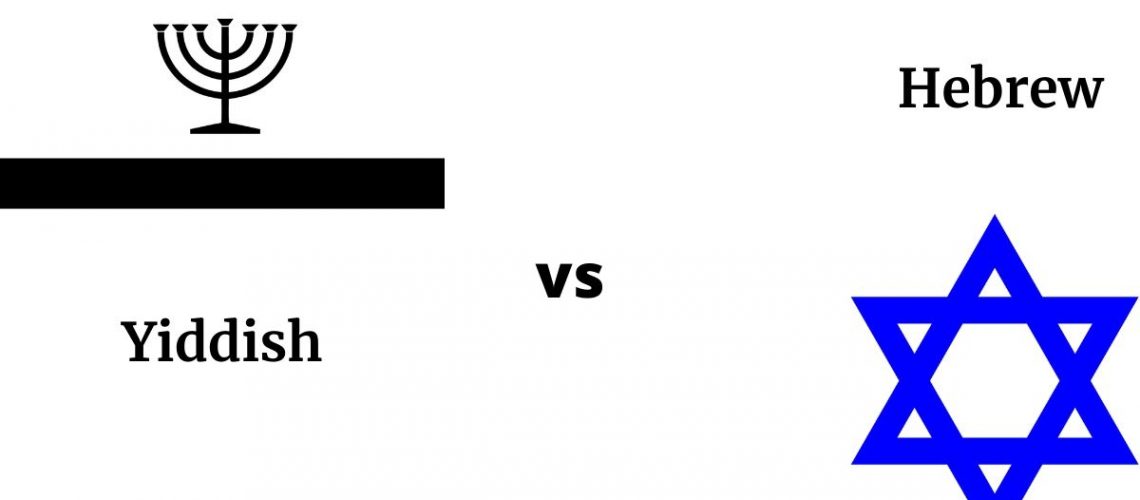People often confuse Yiddish and Hebrew for being close languages. At first glance the two languages might look identical, and to be fair they’re both Jewish languages so shouldn’t they be similar?
The short answer is no. Hebrew (Biblical and Modern) is a Semitic language, while Yiddish is a Germanic language. Both use the Hebrew writing script, but when spoken the two sound very different and thus they’re completely different languages.
Continue reading to find out more about their differences, and also some of their similarities.
Are Yiddish and Hebrew the Same?
So let’s dive deeper into this question. In this article we’re primarily focusing on Modern Hebrew and YIVO Yiddish or standard Yiddish.
At first glance they both look similar when written, but for the most part Yiddish is closer to standard German and many Hebrew speakers wouldn’t understand Yiddish at first. However, since most Yiddish speakers are from the Haredim (Orthodox) community they would likely be able to understand Modern Hebrew relatively well, given that modern Hebrew is derived from Biblical Hebrew.
How different are Yiddish and Hebrew?
During the middle ages, Jews in the Rhine Valley spoke Judeo-French and Judeo-Italian, then after being kicked out or France they settled in Western Germany. This is where we see the emergence of Western Yiddish. The language was comprised of High-German, Hebrew, Aramaic, and some French & Italian. If you’re interested in learning more about the history of Yiddish, you can watch our video on What is Yiddish? A Brief History of the Mother Tongue
So in short, they’re quite different given that Yiddish is a Germanic language with a lot more influence from High-German and some Slavic languages, while Hebrew is a Semitic language.
Are the two at least similar?
Simply put, yes. The two are somewhat similar as they both use the same script, and are both Jewish languages. In fact Yiddish has a lot of Hebrew vocabulary.
So yes the two are similar in some regard, and as with any Judeo-X language, the Jews simply adopted the local language and sprinkled it with a little Aramaic and Hebrew.
Yiddish vs. Hebrew Alphabet
Standard Yiddish is written phonetically for the most part, and is a lot easier to decipher than Hebrew. Modern Hebrew has no vowels in its everyday usage, so you have to memorize pronunciation of the word a lot more than with Yiddish.
The Yiddish alphabet also made some additions to the Hebrew alphabet to make it easier to express German pronunciation such as “ay” which is pronounced like “ay” in “fly” and “ey” as in “clay”
Below you’ll also notice how some of the letters are named different. For example in Hebrew, we know ב as”bet” but in Yiddish it’s called “beyz”


Hebrew and Yiddish words
Let’s take a look at some of the vocabulary. Many words in Yiddish are closely related to Hebrew and you’ll find that to be a common theme among all Judaic languages.
| English | Hebrew | Yiddish |
| Shabbat | שבת (shabbat) | שבת (shabbos) |
| Family | משפּחה (mishpachah) | משפּחה (mispokhe) |
| Hello | שלום (shalom) | שלום (sholem) |
| Holy | קידוש (kiddush) | קודש (koydish) |
Interesting fact: In Yiddish, Hebrew is referred to as (aside from Hebreish), loshn koydish meaning “holy tongue” or “holy language.”
So you’ll find a lot of common words between the two language, but as mentioned earlier the two are still their own language. Just like how we can find some French words in English such as “cliché” or “déjà vu”
Yiddish vs. German
Yiddish and German are very similar linguistically. Modern German is derived from Middle-High German, and so is Yiddish, so you’ll definitely see a lot of similarities. The two share very similar grammar points and a LOT of vocabulary.
The following video will give you a better understanding of how the two languages sound similar, and also quite different.
What makes Yiddish and German different
Aside from the obvious writing difference, at the end of the day, Yiddish is a Jewish language that also borrowed a lot of vocabulary from Polish, Ukrainian, Lithuanian, and a few other languages. One might say that Yiddish is more related to German than Dutch is to English (both English and Dutch are West-Germanic descendants and do sound quite similar).
Another thing that makes Yiddish quite different from German is not necessarily their vocabulary or syntax, but word choice and literature. Yiddish writers tend to place a lot of emphasis on the building blocks of love, and spirit. A lot of their idioms reflect that as well, for instance: קײנער זעט ניט זײַן אײגענעם הױקער “Keyner zet nit zayn eygenem hoyker.” which means “No one sees the hump on their own back”
One might also say that Yiddish is a sassy language compared to German which we think of as an aggressive language.
Which Language Should I Choose to Study?
So if you’re looking to learn more about Jewish history, culture, etc. you’re gonna want to pickup a Jewish language. Now you have a lot of options, aside from which section of Judaism and Jewish culture you want to study, you can learn Biblical Hebrew, Aramaic, Yiddish, Ladino, Modern Hebrew, Judeo-Italian and a few others.
Do you want to learn about Jews in Europe?
If you want to learn about Jewish culture in Europe, definitely go with Yiddish! It’s got some rich history, great idioms, funny vocabulary, and surprisingly enough it has a lot of resources. If you’re interested in some textbooks we have a list on the best books to learn Yiddish.
Do you want to speak with Israelis?
If you’re looking to speak with Israelis then you’re not going to gain much by studying Yiddish. It’s not so common in Israel, and you’re better off learning Modern Hebrew. It’s more common than Yiddish and there are definitely a lot more resources to learn modern Hebrew.
Do you want to enrich your religious studies?
If you want to enrich your religious studies then learning Aramaic or Biblical Hebrew will definitely be a good choice for you. We’ll be writing articles on Aramaic and Biblical Hebrew shortly so be on the look out for that!
Looking to Learn Yiddish?
If you’re interested in picking up some Yiddish read out article on How to Learn and Speak Yiddish where we cover what you need to know about the language before getting started, and give advice on how to effectively study the language.
